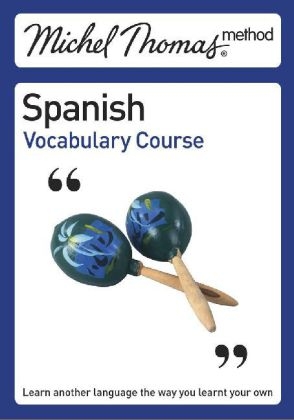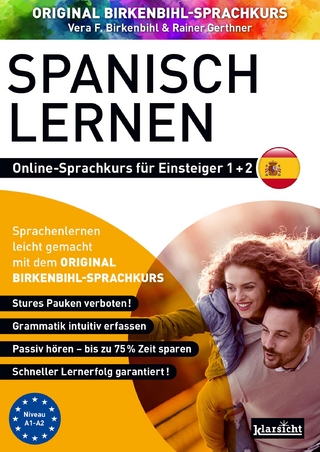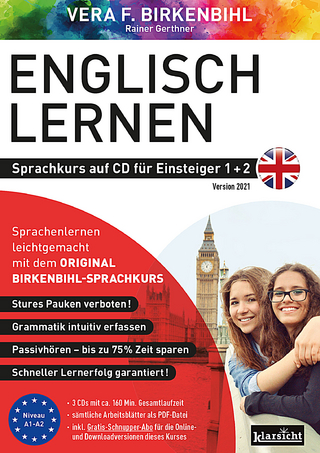
Michel Thomas Method
John Murray Learning (Verlag)
978-0-340-93973-4 (ISBN)
- Titel ist leider vergriffen;
keine Neuauflage - Artikel merken
Learn another language the way you learnt your own! As a child, you learnt your own language naturally and enjoyably: now you can learn Spanish vocabulary in the same way. Use the unique method perfected over fifty years by the celebrated psychologist and linguist Michel Thomas This method works with your brain, helping you to build up your Spanish in manageable, enjoyable steps by thinking out the answers for yourself. You learn through listening and speaking - the way you learnt as a child. You then pick up the language naturally and unforgettably. This NEW Vocabulary Course builds on the Foundation and Advanced Courses to increase the number and range of words you will be able to use. Rose Lee Hayden, Michel Thomas's most trusted teacher, shares her first-hand insights to give you over 1,000 words in a unique and memorable way. She is joined by two native speakers to make sure your pronunciation is perfect, while a booklet shows you the written language. You'll stick with it because you'll love it!
Dr Rose Lee Hayden had a highly successful career in the US, before moving from New York to live in Italy in the wake of 9/11. At the age of 17 she started working as a volunteer for the American Red Cross travelling throughout South America and becoming fluent in Spanish and Portuguese. On graduating from university she went on to work as an instructor of Spanish for the Peace Corps, rising to become Deputy Director for Latin America and the Caribbean, responsible for a $20 million language and cultural programme. She met Michel Thomas in 1982 as a result of her interest in his innovative method and amazing results, and studied German with him. This was the beginning of a long and exciting collaboration, developing his programme and teaching his 'Second Phase' Spanish students. She now lives outside Rome, where she continues to write, teach, and play jazz piano.
Introduction: How this course came about, what it does and does not include, how it works, and how it is both faithful to and expands upon the Michel Thomas Language Courses COURSE SEGMENT 1: WHAT YOU ALREADY KNOW 1. Introduction; "-ible" to "-ible" > possible - posible (one stingy "s"); horrible - horrible; etc. 2. "-able" to "able" > probable - probable; acceptable - aceptable; etc. 3. "-AR" verbs to "-able" Remove the "-AR" and add "-able" > dudar (to doubt) to dudable (doubtful); soportar (to bear) to soportable (bearable); tolerar (to tolerate) to tolerable; etc. 4. Add "in" to make a negative word > evitable (avoidable) to inevitable (inevitable; unavoidable); tolerable to intolerable; etc. Diminutive "-ito" > hijo (son) to hijito (affectionate, little boy); > Juan to Juanito (nickname). > besar (to kiss) to besable (kissable) 5. " -ER verbs to "ible" > creer (to believe) to creible (believable); vender (to sell) to vendible (sellable); etc. " - IR verbs to "-ible" > definir (to define) to definible (definable) "-ible" to "-ible" > flexible to flexible; compatible to compatible; etc. 6. " - ant" to "-ante" > important to importante; restaurant to restaurante; etc. "-AR" verbs to "-ante" >participar (to participate) to participante (participant); alarmar (to alarm) to alarmante (alarming); etc. 7. "-ent to "-ente" > different to diferente (one stingy "f"); evident to evidente; incompetent to incompetente; etc. 8. "-tion" to "-cion" > condition to condicion; attention to atencion; formation to formacion; etc. 9. "-sion" to "-sion" > impression to impresion (one stingy "s"); decision to decision; mission to mision (one stingy "s"); etc. 10. "ence" to "encia" > influence to influencia; difference to diferencia (one stingy "f"); preference to preferencia; etc. 11. Words that look feminine but are masculine > the problem to el problema; the map to el mapa; the climate to el clima; etc. "-ance" to "-ancia" > importance to importancia; elegance to elegancia; intolerance to intolerancia; etc. 12. "-ly" to "-mente" automatically to automaticamente; naturally to naturalmente; personally to personalmente; etc. Use "realmente" for actually. 13. "-ary" to "-ario" > vocabulary to vocabulario; necessary to necesario (one stingy "s"); contrary to contrario; etc. 14. "-ive" to "-ivo" > exclusive to exclusivo; positive to positivo; constructive to constructivo; etc. 15. "-ute" to "-uto" >absolute to absoluto; substitute to substituto; institute to instituto; etc. "-ous" to "-oso" > famous to famoso; etc. 16. "-ical" to "-ico" > practical to pratico; basic to basico; magic to "magico"; etc. Require an accent over stressed syllable. 17. "-ent" to "-ento" > talent to talento; moment to momento; "-t" or "-it" to "-to" > honest to honesto; Robert to Roberto; credit to credito; etc. "-ic" to "-ico" > dramatic to dramatico; automatic to automatico; ironic to ironico; etc. Require an accent over the stressed syllable. 18. "-ure" to "-ura" - temperature to temperatura; literature to literatura; culture to cultura; etc. 19. "-tude" to "-tud" > aptitude to aptitud; altitude to altitud; gratitude to gratitude; etc. 20. "-ity" to "-dad" > possibility to posibilidad (one stingy "s"); humanity to humanidad; infinity to infinidad; etc. 21. "-ist" to "-ista" > artist to artista; dentist to dentista; optimist to optimista; etc. 22. "-y" to "ia" > irony to ironia; astronomy to astronomia; philosophy to filosofia (phonetic ph - f); etc. Require an accent over the stressed syllable. 23. "-in" or "-ine" to "-ina" > aspirin to aspirina; discipline to disciplina; gasoline to gasolina; etc. "-ice" to "ina" > office to oficina (one stingy "f") 24. "-id" to "-ido" > solid to solido; valid to valido; timid to timido; etc. Require an accent over the stressed syllable. 25. "-ism" to "-ismo" > organism to organismo; capitalism to capitalismo; heroism to heroismo; etc. " -ure" to "-uro" > future to futuro. COURSE SEGMENT 2: MORE STRUCTURE: MORE VERBS AND HOW TO USE THEM 1. "-AR" "Good Guy" Regular Verbs >evitar (to avoid); tentar (to tempt); usar (to use); inventar (to invent); mencionar (to mention); formar (to form); gastar (to spend) Using "gustarse" - "It is pleasing..." "It pleases me, you, us, them..." Using "deberia" to express "should" More "-AR" "Good Guys" > gritar (to shout); ganar (to earn; to win) Wing tense endings: "-AR" Track and The Other Track aba; abas, aba; abamos, aban ia, ias, ia, iamos, ian 2. Inventing "-AR" Verbs Using "-tion" Words in English. Just remove the "tion" and add an "r". > invitation to invitar (to invite); justification to justificar (to justify); etc. More "-AR" "Good Guys" olvidarse (to forget); cenar (to dine); imaginar (to imagine); admirar (to admire); instalar (to install); adorar (to adore); considerar (to consider); acusar (to accuse); inspirar (to inspire); clasificar (to classify); estudiar (to study); consolar (to console); administrar (to administer); etc. 3. More "-AR" "Good Guys" > negociar (to negotiate) Using "si fuera" for "If I were..." plus the conditional tense (-ria; rias; riamos; rian) > Si fuera mas joven, compraria un apartamento en Mallorca. (If I were younger, I would buy an apartment in Mallorca.) When "would" refers to the past. > Cuando era un hombre rico, compraba un coche nuevo todos los anos. (When I was a rich man, I WOULD buy a new car every year.) 4. More "-AR" "Good Guys" > limpiar (to clean); llamar (to phone; to call); gastar (to spend); mirarse (to look at); prestar (to lend); besar (to kiss) In Spanish, you spell it like it sounds. > tocar (to touch) in command tense, "toque", etc. > atacar (to attack) in command tense, "ataque", etc. 5. "Good Guys" from the Other Track: "-ER" and "-IR" beber (to drink); aprender (to learn); comprender (to understand); entender (to understand); responder (to respond; to answer); escribir (to write) 6. Reflexive Verbs - When the Subject and Object are the Same: Think "...self" > esconderse (to hide oneself); despertarse (to wake up; to wake oneself up); sentarse (to sit down; to sit oneself down); levantarse (to get up or stand up; to get oneself up) lavarse (to wash oneself); casarse (to get married); vestirse (to get dressed; to dress oneself); irse (to go away); dormirse (to fall asleep); hacerse (to become; make of oneself); quejarse (to complain); darse cuenta de (to realize); olvidarse (to forget); expresarse (to express oneself); alegrarse (to be glad) The Impersonal "One" > Se come bien aqui. (One eats well here.) The Passive Voice: When the Subject is Acted Upon > El museo se abre todos los dias. (The museum is opened every day.) 7. More practice with "-ER" verbs and reflexives. > prometer (to promise); poder (to be able to); responder (to respond; to answer); caber (to fit into); llover (to rain); ofrecer (to offer); > protegerse (to protect oneself); defenderse (to defend oneself) 8. More "-ER" Verbs > deber (should, ought to); vender (to sell) "GO GO to GA GA" Verb > valer (to be worth); valer la pena (to be worth it) Ex. valgo to valga in command tense. Using "sino" to express "but rather" No soy rico sino pobre. (I am not rich, but rather poor.) 9. More "-ER" Verbs > temer (to fear); toser to cough); creer (to believe); crecer (to grow); reconocer (to recognize); meter (to place or put) 10. Some "-IR" Verbs > admitir (to admit); insistir en (insist on); invadir (to invade); omitir (to omit); decidir (to decide); sufrir (to suffer); recibir (to receive); cubrir (to cover) describir (to describe); abrir (to open); huir
| Erscheint lt. Verlag | 12.7.2007 |
|---|---|
| Reihe/Serie | Michel Thomas Series |
| Sprache | englisch |
| Maße | 146 x 196 mm |
| Gewicht | 436 g |
| Themenwelt | Schulbuch / Wörterbuch ► Wörterbuch / Fremdsprachen |
| Geisteswissenschaften ► Sprach- / Literaturwissenschaft ► Sprachwissenschaft | |
| ISBN-10 | 0-340-93973-7 / 0340939737 |
| ISBN-13 | 978-0-340-93973-4 / 9780340939734 |
| Zustand | Neuware |
| Haben Sie eine Frage zum Produkt? |
aus dem Bereich


